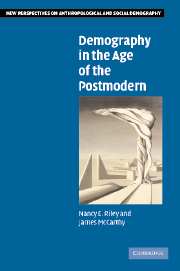Book contents
- Frontmatter
- Contents
- Acknowledgments
- 1 Introduction: why examine demography?
- 2 A brief introduction to postmodernism
- 3 The essentials of demography
- 4 A genealogy of demography
- 5 Demography's place in the social sciences
- 6 Feminist demography
- 7 Postmodern perspectives in demography
- 8 Some final thoughts
- Notes
- References
- Index
6 - Feminist demography
Published online by Cambridge University Press: 05 June 2012
- Frontmatter
- Contents
- Acknowledgments
- 1 Introduction: why examine demography?
- 2 A brief introduction to postmodernism
- 3 The essentials of demography
- 4 A genealogy of demography
- 5 Demography's place in the social sciences
- 6 Feminist demography
- 7 Postmodern perspectives in demography
- 8 Some final thoughts
- Notes
- References
- Index
Summary
Today, as books in feminist anthropology, sociology, and political science proliferate, the term “feminist demographer” remains an oxymoron.
(Greenhalgh 1995: 602)The experience of scholars attempting to incorporate gender into demographic analyses is illustrative of the difficulties of using interpretive approaches in the study of population. The importance of doing so underscores the arguments we are making in this book: broadening the way that we look at population issues and measures will allow a fuller, richer account of population behavior and change. In this chapter, we examine the ways that demography understands, measures, and uses gender in its analyses and interpretations of those analyses, and in its overall understanding of population change. We discuss the reasons why doing work on gender is difficult within the current confines of demography and the ways in which adding richer gender perspectives could contribute to our understanding of demographic processes.
Gender in demography? A brief account of the history
While demography has neglected many issues of gender, there has been no lack of work on women, most obviously because of the heavy focus on fertility. Even early in the history of demography there was a certain attention to the lives of women, especially in fertility studies (Watkins 1993). Many more recent studies include some measure of “women's status” within their overall analysis of demographic dynamics.
- Type
- Chapter
- Information
- Demography in the Age of the Postmodern , pp. 99 - 119Publisher: Cambridge University PressPrint publication year: 2003



